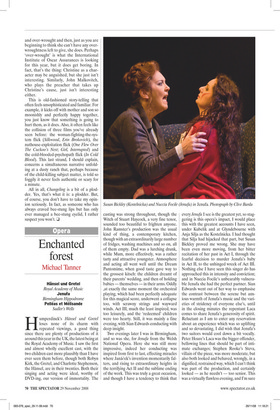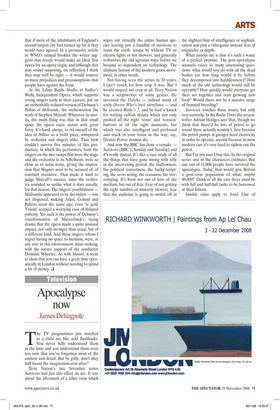Enchanted forest
Michael Tanner
Hänsel und Gretel Royal Academy of Music Jenufa Birmingham Hippodrome Pelléas et Mélisande Sadler’s Wells
Humperdinck’s Hänsel und Gretel loses none of its charm with repeated viewings, a good thing since there are plenty of productions of it around this year in the UK, the latest being at the Royal Academy of Music. I saw the first and almost wholly excellent cast, with the two children cast more plausibly than I have ever seen them before, though both Robyn Kirk, the Gretel, and Charlotte Stephenson, the Hänsel, are in their twenties. Both their singing and acting were ideal, worthy of DVD-ing, our version of immortality. The casting was strong throughout, though the Witch of Stuart Haycock, a very fine tenor, sounded too beautiful to frighten anyone. John Ramster’s production was the usual kind of thing, a contemporary kitchen, though with an extraordinarily large number of fridges, washing machines and so on, all of them empty. Dad was a lurching drunk, while Mum, more effectively, was a rather tarty and attractive youngster. Atmosphere and acting all went well until the Dream Pantomime, when good taste gave way to the grossest kitsch: the children dreamt of their parents’ wedding, and then of holding babies — themselves — in their arms. Oddly ,at exactly the same moment the orchestral playing, which had been perfectly adequate for this magical score, underwent a collapse too, with scrawny strings and wayward winds. Act III, much the least inspired, was too leisurely, and the ‘redeemed’ children were too hearty. Still, it was mainly a fine evening, with Sian Edwards conducting with deep insight.
Two evenings later I was in Birmingham, and so was she, for Jenufa from the Welsh National Opera. Here she was still more impressive, indeed her conducting was inspired from first to last, effecting miracles where Janáček’s invention momentarily falters, and rising to extraordinary heights in the terrifying Act II and the sublime ending of the work. This was truly a great occasion, and though I have a tendency to think that every Jenufa I see is the greatest yet, so staggering is this opera’s impact, I would place this with the greatest accounts I have seen, under Kubelik and at Glyndebourne with Anja Silja as the Kostelnicka. I had thought that Silja had hijacked that part, but Susan Bickley proved me wrong. She may have been even more moving, from her bitter recitation of her past in Act I, through the fearful decision to murder Jenufa’s baby in Act II, to the unhinged wreck of Act III. Nothing else I have seen this singer do has approached this in intensity and conviction; and in Nuccia Focile’s unbearably vulnerable Jenufa she had the perfect partner. Sian Edwards went out of her way to emphasise the contrast between the serene but anxious warmth of Jenufa’s music and the varieties of stridency of everyone else’s, until in the closing minutes the repentant Laca comes to share Jenufa’s generosity of spirit. Reluctant as I am to enter any reservation about an experience which was so uplifting and so devastating, I did wish that Jenufa’s two suitors would cool down a bit vocally. Peter Hoare’s Laca was the bigger offender, bellowing lines that should be part of intimate exchanges; Stephen Rooke’s Steva, villain of the piece, was more moderate, but also both looked and behaved, wrongly, in a dignified, restrained way, which I can’t think was part of the production, and certainly looked — as he needn’t — too senior. This was a virtually flawless evening, and I’m sure that if more of the inhabitants of England’s second largest city had turned up for it they would have agreed. In a persuasive article in WNO’s annual booklet the writer suggests that Jenufa would make an ideal first opera for an opera virgin, and although that may sound surprising, on reflection I think they may well be right — it would remove so many prejudices and preconceptions that people have against the form.
At the Lilian Baylis Studio at Sadler’s Wells, Independent Opera, which supports young singers early in their careers, put on an orchestrally reduced version of Debussy’s Pelléas et Mélisande, the orchestration the work of Stephen Metcalf. Whatever its merits, the main thing was that in that small space the opera came across with great force. It’s hard, always, to rid oneself of the idea of Pelléas as a twilit piece, whispered by orchestra and singers alike. That view couldn’t survive five minutes of this production, in which the performers, both the singers on the two ramps that were the stage and the orchestra in its Nibelheim, were so close as to seem noisy, giving the impression that Wagner used to be accused of, of constant overdrive. That made it hard to judge Metcalf’s success, since the orchestra sounded so unlike what it does usually, for that reason. The singers’ youthfulness — Mélisande appeared to be the oldest — was not disguised, making Arkel, Golaud and Pelléas seem the same age; even ‘le petit Yniold’ seemed a worrying case of delayed puberty. Yet such is the power of Debussy’s transformation of Maeterlinck’s trying drama that the opera made a quite unusual impact, not only stronger than usual, but of a different kind. And these singers, whom I regret having no space to mention, were, at any rate in this environment, most striking, with the secure support of the conductor Dominic Wheeler. As with Hansel, it went to show that you can have a great time operatically in London without needing to spend a lot of money. ❑



































































































 Previous page
Previous page